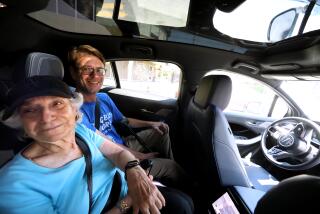Road rage over ‘taxis’ in South Africa
- Share via
JOHANNESBURG, SOUTH AFRICA — “Suddenly a pair of bright headlights appeared around a corner. It was a taxi speeding directly towards us, on our side of the road.” Michelle Strydom, on the Facebook group Genoeg is Genoeg (Enough is Enough, in Afrikaans)
“He collided with us head-on with such force that it shot his windscreen and side window out.” Althea Greybe on Facebook
“I fear the day I will snap, because I will do something I regret doing. That is why I try to ignore [taxi drivers] but that is almost impossible.” Sarel Breed on Facebook
Most South Africans don’t take chances with the men behind the wheels of “taxis” -- the minibuses that ferry millions of mainly black commuters to work daily. Motorists and pedestrians get out of their way.
Come peak hour, taxi drivers shuttle nonchalantly from lane to lane, cruise through red traffic lights, turn left from the right lane across traffic and even head toward oncoming cars like demolition derby racers.
Their jalopies are often beat-up, in some cases barely roadworthy. They drive with their windows down; they play their music loud.
Most motorists seethe silently behind the wheel when a taxi barges in.
But the pent-up road rage -- mainly of white drivers -- poured out in a Facebook group cataloging complaints about taxis. It has gained more than 56,000 members since the group was set up after 16-year-old Pretoria schoolgirl Bernadine Kruger was hit on her motor scooter and killed by a taxi driver Feb. 23. The driver, Percyval Matji, 31, has been charged with culpable homicide.
Another organization, Afriforum, representing mainly white South Africans, recently urged drivers to photograph reckless taxi drivers breaking the law. Kallie Kriel, the group’s leader, said 500 photographs had been sent to its website in the last week.
But motorists are not the only people angry. Taxi drivers, furious about government plans to introduce a regulated bus service to replace many taxis, showed their muscle Tuesday. They staged a strike and protest in Johannesburg, blocking intersections, stoning cars and stranding thousands of commuters. A bus driver was shot in the hand.
In December, taxi drivers paralyzed Cape Town in a similar protest.
The confrontation between taxi drivers, other motorists and the government amounts to one of South Africa’s thorniest post-apartheid problems: how to provide a safe, efficient public transit system incorporating the wild and unregulated taxi sector that sprang up under apartheid as transportation for the underclass.
In January, the London-based analytical journal Africa Confidential said South Africa’s taxi industry, with its opposition to public bus services, was capable of undermining the 2010 soccer World Cup and a June rugby tour by a British team.
“The peace at these prestigious events is threatened by the violent and out-of-control taxi industry, whose spokesmen oppose the government’s investment in public transport ahead of the World Cup,” the journal said.
The first stage of the Bus Rapid Transit system, which would remove taxis from certain commuter routes and replace them with a bus system, is to be launched in June.
The poor safety record of taxis is often cited. In the latest example, one person was killed Tuesday and 18 were injured in a Durban taxi accident.
“The problem is, I don’t think the industry likes to be regulated,” said Kriel of Afriforum.
“At the moment, people are transgressing the rules, and if they were part of the system it would be easier to take them on.”
Despite the rage that taxi drivers often provoke, South Africa would shut down without their minibuses. The industry says it ferries to work 65% of the commuters who don’t use cars. It sees itself as one of the most vibrant and competitive sectors of the small-business economy.
Now, taxi drivers fear they’re being ditched for a centralized system that offers them questionable benefits.
“The drivers are afraid of losing their jobs when the Bus Rapid Transit system comes in,” said Thomas Masase, spokesman for the South African National Taxi Council, which represents many taxi drivers. He said the strike Tuesday was a spontaneous action by angry drivers.
“In those countries where Bus Rapid Transit systems are in existence, taxis on those particular routes aren’t utilized by commuters. Commuters prefer BRT buses,” Masase said in a telephone interview.
But the Democratic Alliance, an opposition party, said taxi drivers have to accept competition.
“The BRT is simply competition. Better advertising, improved driver safety and cheaper prices would be far more effective than striking and preventing people from going to work,” Ann Barnes, the party’s spokeswoman on traffic in Johannesburg, said in a statement.
Independent transportation analyst Paul Browning said in a phone interview that the BRT would benefit South Africa, but should be phased in more gradually.
He said taxi drivers and operators were afraid to lose their small cash businesses for the sake of a formalized, regulated system -- even though the government had promised that those with taxis would be brought into the BRT system as drivers and shareholders.
Browning said taxis were a symbol of their owners’ financial security and status in the community.
“To exchange that for a piece of paper that says you are a shareholder of a company -- and now please get out of the way while some terribly clever people run this -- I think that’s just too big a jump to make,” Browning said.
“My advice to government is that the informal sector needs a phased system where, step by step, they’re brought into the new environment.”
--
More to Read
Sign up for Essential California
The most important California stories and recommendations in your inbox every morning.
You may occasionally receive promotional content from the Los Angeles Times.










